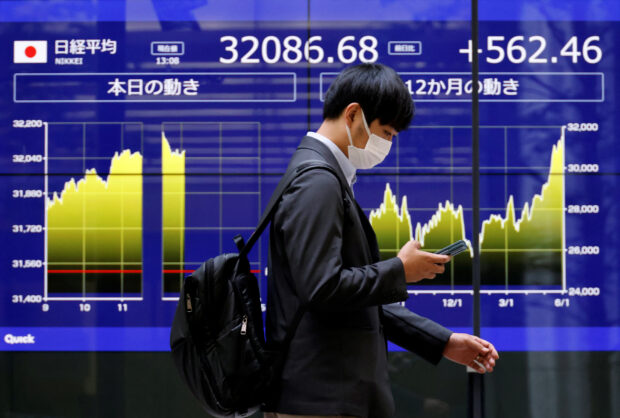Oil jumps as US, UK strike on Houthis sparks safe-haven push

A man walks past an electric monitor displaying Japan’s Nikkei share average and recent movements, outside a bank in Tokyo, Japan, June 5, 2023. REUTERS/Issei Kato/File photo
LONDON -Global shares edged up on Friday while oil surged as the conflict in the Red Sea region appeared to escalate, while slightly hotter U.S. inflation data did not shift investors’ view that interest rates could soon start to fall.
The MSCI All-World share index was up 0.3 percent, reflecting a bounce in Europe, where the STOXX 600 rose nearly 1 percent, led partly by a rally in shares of aerospace and defense companies, where the sector index hit a record high.
U.S. stock futures held steady, while government bond yields fell, reflecting demand among investors for safe-haven assets.
Oil rose by as much as 2.6 percent after the United States and Britain said they had launched strikes from the air and sea against Houthi military targets in Yemen in response to the group’s attacks on ships in the Red Sea, a dramatic regional widening of the Israel-Hamas war in Gaza.
Brent futures were last up 2.45 percent at $79.25 a barrel, while U.S. West Texas Intermediate (WTI) crude rose 2.6 percent to $73.86.
READ: US, Britain carry out strikes vs Houthis in Yemen – officials
“This morning, the oil price has responded in a relatively measured way – Brent is still below $80 a barrel – and the fixed income market is responding from the perspective that this might well not be so great for growth, but it is not a concern from an inflationary perspective, so there is a slight flight to quality, but not something that is a game-changer,” Daiwa Capital Markets head of economic research Chris Scicluna said.
The dollar edged up against a basket of major currencies, as did gold, which benefitted from investor risk aversion, rising 0.5 percent to $2,040 an ounce. Other classic safe-havens such as the Swiss franc held mostly steady, a situation that some analysts said could change.
“If we see a massive escalation of the situation … then the traditional flight-to-safety will see U.S. Treasuries, safe-haven currencies like yen and Swiss franc benefit.” said Khoon Goh, head of Asia research at ANZ in Singapore.
In Asia overnight, Japan’s Nikkei extended its impressive gains so far this year, jumping 1.5 percent to another 34-year high, helped by solid results from Fast Retailing Co, owner of clothing brand Uniqlo.
Chinese inflation data showed the country’s economic recovery remained weak in December, with the consumer price index falling 0.3 percent from a year ago. However, separate trade data showed exports rose at a faster than expected clip last month while imports returned to growth.
READ: China’s consumer prices fall fastest in three years
Data on Thursday showed U.S. consumer prices rose more than expected in December, with a closely watched core measure coming in slightly above consensus.
However, the details of the report showed that pressures picked up in specific pockets of the consumer market, such as energy and the cost of used cars, as well as other seasonal factors that should abate, according to economist Mohit Kumar at Jefferies.
“Our view remains that for the Fed to cut rates aggressively they need to either see the economy falling off a cliff or a sharp fall in inflation. And we do not see either scenario,” he said in a morning note.
Fed officials drew few new conclusions from the data. Richmond Fed President Thomas Barkin said it did little to clarify the path of inflation.
READ: Fed rate cuts may wait as inflation ticked up in December
Futures showed traders are attaching a 73-percent probability of a rate cut by March, compared with 68 percent a day earlier. They are also pricing in around 150 basis points (bps) of easing this year.
Treasuries held steady after a powerful rally in the shorter-dated bonds overnight. The two-year yield was unchanged at 4.26 percent, having fallen 11 bps points overnight, while the 10 year was steady at 3.97 percent.
Euro zone government bonds drew in flows, pushing the yield on the benchmark 10-year German Bund down 6 bps to 2.146 percent.
Adding some support in the European bond market were comments from European Central Bank (ECB) President Christine Lagarde who said rate cuts could happen if the central bank had certainty that inflation had fallen to its 2 percent target.